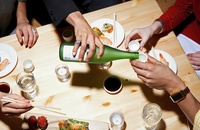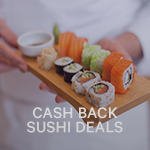How to Eat Sushi: A Guide to Sashimi, Nigiri & More
If you've never tried sushi before, it can seem a little intimidating. First, there's the whole raw fish thing—can it really be safe to eat? Secondly, how would you order something if much of the menu was in Japanese? Finally, what about handling those chopsticks—you'd rather not have to ask for a knife and fork.
We want to help teach you how to eat sushi, so we put together this guide for you learn a little sushi etiquette, the different between sashimi and nigiri, and whether or not all this raw fish constitutes a healthy meal. To find sushi deals near you, click the banner below.
HOW TO ORDER SUSHI
You'll likely be given a sheet of paper with available sushi to eat and a pencil to mark your selection. Simply mark "1" next to any sushi you want.
- For the best experience: Sit at the bar, where you can talk to the chef and get his or her recommendations.
- For the best meal: Order a little bit of everything, a few nigiri, a few maki, and a few sashimi. Don't know what those are? Read the next section.
FIND SUSHI DEALS NEAR YOU
Click one of the boxes below to see sushi deals at restaurants near you:
SUSHI VS SASHIMI: WHAT'S THE DIFFERENCE?
Sushi is (typically) raw seafood and other vegetables that have been wrapped up in vinegary rice or seaweed. Sashimi is only the seafood–no rice or seaweed.
- There's a third option: Nigiri. This is a little bit of both. It's a piece of seafood that lays on top of a bed of rice.
- Maki is the name for a sushi roll, typically six or eight pieces of sushi that's served together.
- You might also see temaki, which is sushi rolled inside a seaweed cone.
WHAT ARE OTHER TYPES OF SUSHI?
If you scan the menu, there might be dozens of types of sushi and Japanese vocabulary you don't recognize. Let's clear up what means what:
- Tako: Octopus (this is also the name of a knife the chef uses)
- Toro: Tuna, though you might also see tuna called maguro or magura
- Uni: Sea urchin (pronounced "oo-nee")
- Sake: Salmon...although this is also the word for fermented rice wine.
- Nori: The seaweed typically used to wrap sushi
- Unagi: Freshwater eel, always cooked
- Ebi: Shrimp, always cooked
- Tobiko: Roe, i.e.those little orange eggs that provide texture on top of some sushi
WHAT'S A CALIFORNIA ROLL? (OR A PHILADELPHIA ROLL?)
As their names implies, both of these popular rolls were created in America, and you won't find them in Japan. But don't feel ashamed about ordering either!
- California roll: Avocado, imitation crab, and cucumber
- Philadelphia roll: Cream cheese, avocado, and salmon
HOW TO USE CHOPSTICKS
This can be tricky, but you'll get it down with practice. Here's how to get started:
- Rest one chopstick in between your thumb and pointer finger, and on top of your ring finger. The skinnier end should be pointed towards the food.
- Hold the other chopstick with your thumb and pointer finger.
- The first chopstick is an anchor and doesn't move. Move the second chopstick instead, using it to grip the sushi.
SUSHI ETIQUETTE TO KNOW
For the most part, all you have to do is dip your sushi in soy sauce and enjoy. But if you're headed to Japan or dining at a fancy sushi restaurant, you might want to follow these rules:
- Chopstick etiquette: Don't rub the sticks together, and don't stick them upright into your sushi or rice.
- There will be a few slices of ginger on your plate. This is for cleansing your palate, and not to be eating with sushi.
- When eating nigiri (a piece of fish on a bed of rice), use the fish side to dip into the soy sauce, instead of getting your rice soggy.
- If your meal is omakase style, it might be considered impolite if you don't eat every piece of sushi (see our guide to omakase below)
- Skip the to-go box. Sushi isn't one of those foods you eat as leftovers.
IS SUSHI HEALTHY?
It depends on what and how many sushi you order. If you want to eat sushi that's good for you, stick to salmon and tuna maki or sashimi.
- What's not healthy? Any roll that's been fried, uses lot of mayo, or cream cheese.
- Instead of mayo, use wasabi. It's high in antioxidants, and it'll add flavor to your meal.
- Choose the low-sodium soy sauce, especially if you're watching your salt intake.
- Is it safe? Eating any raw food carries some risk, but that risk is greatly reduced if you eat at a reputable restaurant, where the chef knows how to safely prepare your food.
OUR BEST SUSHI DEALS LIVE RIGHT NOW
To find sushi near you, check our deals for local Japanese restaurants. Or take a peek at top deals live right now:
Chicago: $18 for $35 worth of sushi at Kitchenette Restaurant in Lakeview
New York: $28 for 2 hours of all-you-can-eat sushi & teriyaki at Kikoo Sushi in East Village (up to $60 value)
San Francisco: 20% cash back at Shido Sushi in Hayes Valley
Omaha: $15 for $25 worth of sushi at Okinawa Sushi Grill
Houston: $20 for $30 worth of sushi at Sushi Sakura Express
Seattle: $60 for chef's 3-course prix-fixe dinner for two at I Love Sushi on Lake Union ($90 value)
Los Angeles: 30% cash back at Zen Maru Japanese Sushi & Grill in Long Beach
LEARN MORE WITH OUR GUIDE TO SUSHI VIDEO:
RELATED READS:
 Six Rules for Sipping Sake
Six Rules for Sipping Sake You've paired wine with meat or seafood. Now pair your sake with your sushi.
 When You Dine Omakase, the Sushi Chef's in Charge
When You Dine Omakase, the Sushi Chef's in Charge Unsure what omakase" is? One of our writers experienced first-hand, and can give you the lowdown.
 Nigiri vs Sashimi vs Maki: What's the Difference?
Nigiri vs Sashimi vs Maki: What's the Difference? Confused on what the difference is between sushi, nigiri, and sashimi? Use our handy guide.







